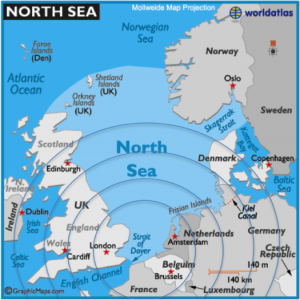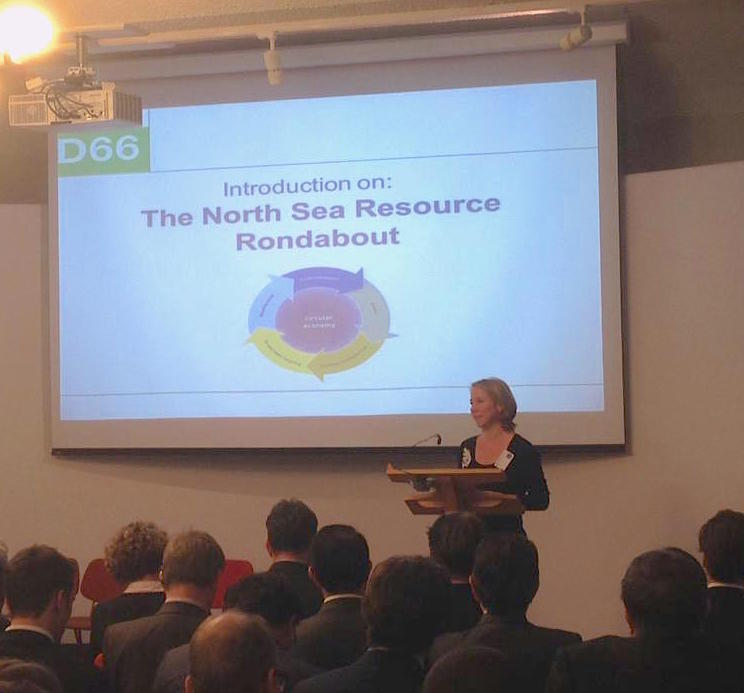On Monday 2nd March the Embassy of the Kingdom of the Netherlands welcomed an expert group of business, policy and academia representatives to the Dutch Centre in London for a conference on how to promote the trade in circular economy goods and services between the UK and the Netherlands. The conference was co-hosted with the Circular Economy Task Force, a business-led group convened by British think-tank Green Alliance looking at how to deliver a more circular economy in the UK.
The discussion was organised around three issues: how policy can support a circular economy, how to deliver a ‘North Sea Resource Roundabout’, and what are the circular economy opportunities for plastics?

FredOlthof
Dutch Ambassador Titia van den Assum opening anglo-Dutch Circular Economy conference #CircularNLUK http://t.co/x0O2Ero9YZ
LoopRecycling
We’re @ #CircularNLUK @DutchCentre, great discussion & much to learn from the Dutch on building recycling into the system: #CircularEconomy
Policy session
Nick Cliffe from Innovate UK set the framework of the Circular Economy and pointed at the importance of innovation. Mrs Wytske van der Mei of the Dutch Ministry of Infrastructure and Environment gave an overview of Dutch Policies while Mr Joris van der Meulen (Waste Fund Representative) presented the impressive results of the Extended Producer Responsibility for plastic packaging. The Director of the Royal NVRD, Mr. Erik de Baedts, showed the best practices in place at Dutch Municipalities.
The policy discussion highlighted how much policy support for the circular economy there is in the Netherlands, especially targets and financial support for separate collections as well as industry recycling targets and commitments to use recycled content.
Support in the UK has been less comprehensive but has focused on bringing new business models to market that support the inner loops – providing a service instead of a product, repair and reuse – of a circular economy. In both countries, policy needs to support cross-sector collaborations that deliver ‘value networks’ as opposed to the current model of linear supply chains. The key question that surfaced up was: can we leave Circular Economy to the market or do we need stronger government intervention? The Dutch have impressive collection and recycling results thanks to strict policies but it comes with a hefty price-tag for industry and inhabitants.
niteshmagdani
Nick @innovate_uk ‘Is what you need a spade or is it a hole’ – business models should focus on consumer focus! #circularnluk
stuhhigh_SITA
Netherlands require some residents to take residual waste to central points (no collection) but collect recyclable materials #CircularNLUK
DPJ_SITAUK
#CircularNLUK @GreenAllianceUK good session on possibility of collaboration with the circular economy but Jealous of Dutch policy & funding!
GijsDiercks
@ErikAfval is pleading for better coordination of waste system. But this diversity of systems also allows for experimentation #circularNLUK
maschmidtwit
The Dutch are teaching us abt #recycling today @DutchCentre. So it’s not only #UrbanTransport & #Cycling they are cleverer at! #CircularNLUK
JulieEHill
Green public procurement helps get over ‘chicken and egg’ problem of supply and demand for secondary products says Dutch MoP #CircularNLUK
TechnicalNature
Challenging the role of voluntary agreements. Are they enough when the models & changes may require more speed & disruption? #CircularNLUK
traceyrc
3 key themes picked out by @JulieEHill from this morning! Innovation, infrastructure and markets. Panel session now at #CircularNLUK
FredOlthof
interesting discussion about whether market or policy is most efficient to promote a circular economy. #circularNLUK
North Sea Resource Roundabout
It is an almost certain long term trend that we will have to use waste more like a resource to fight scarcity and dependency of primary resources and counter negative global trends. Optimised resource use is an important part of a circular economy and good for the environment and job creation. Dutch MP Stientje van Veldhoven (D66) proposed the concept of a North Sea Resources Roundabout. The concept of the North Sea Resources Roundabout would allow countries to collaborate and optimise resource flows within the regulatory framework. Likewise countries like the North Sea countries could be an experimental zone and accelerate towards a regional Level Playing Field. Nico van Doorn of the Port of Rotterdam, Europe’s largest Port and Guido Braam, CEO of the Circle Economy clearly indicated the cross border nature of resource flows and the potential of resource optimisation.
Defining when a waste is a resource is technically complex and challenging but essential to a circular economy according to WRAP’s executive Julie Hill. Europe’s Waste Framework Directive has EoW and By-product mechanisms available but aligning at EU level takes for ever and waiting till the slowest kid in class is ready for it does no longer seem an option from Green Growth perspective. Conference co-chair Freek van Eijk from Acceleratio added that building on pragmatically from the excellent Anglo-Dutch e-tool “IsitWaste” (Environmental Agency & Dutch RWS) makes sense by aligning the interpretation of waste-versus-resource, the justified waste shipment rules and agreeing on appropriate enforcement between the North Sea Countries. No new regulation would be needed. All in all there seemed to be enough support and a lot of interest to present among the audience to Mrs van Veldhoven’s idea of the North Sea Resources Roundabout. The joint challenge is now to bring it further to a follow phase, one that could lead to a “North Sea MoU” between the Port Communities, Ministries and enforcement Agencies around selected cross border flows.

ErikAfval
MEP @SvVeldhoven intoduces the concept of a North Sea #resources #roundabout in London #CircularNLUK #cooperation #EU
GuidoBraam
.@SvVeldhoven emphasizes European frontrunners don’t need to wait for the CEpackage to benefit together from CE http://t.co/zFgStcJube
FredOlthof
Stientje van Veldhoven: North Sea Resource Roundabout as ‘experimental zone within the EU’ #circularNLUK
JulieEHill
#CircularNLUK Port of Rotterdam piloting circular systems eg plastics, including bio based plastics used by Coca Cola.
JulieEHill
Defining when a waste is a resource – technically complex and challenging but essential to CE. See http://t.co/ZU73mFP8Kj #CircularNLUK
Plastic Session
Plastic Europe’s Adrian Whyle pointed out that Plastic is a key flow for both the NL, the UK and Europe as a whole.
The key theme from the morning session: need for innovation, infrastructure and markets came up strongly.
Mr van der Meulen (Dutch Waste Fund) and Maarten Bakker (Delft University of Technology) had previously shown what innovation can bring to the plastic market once a clear policy direction has been set.
The UK could certainly benefit from the recent Dutch learning curve manifesting itself in new collection schemes and improved sorting. But the future will also bring more depolymerisation and, although the focus is strongly on material recycling also innovation in energy recovery for non-recyclables (for example plastics2oil).
Jan Nieuwenhuis Director Green Growth & Biobased Economy of the Ministry of Economical Affairs added that R&D needs a lot more attention from businesses. The recent oil price developments have however has shown a vulnerability and dependency to the new waste derived resource markets. The creation of solid markets with industry uptake of recyclables is key for a healthy circular economy development.
In order to recycle plastics for industry uptake, the fragmented collection infrastructure in the UK should develop first to get the flows out of the waste. Local politicians will need to be aligned.
The Dutch have shown that great results can be made in a short time span although Gev Eduljee from SITA UK pointed out that the Dutch system comes with a price tag that is threefold the level in the UK at present.
Unilever showed that leading multinational are not waiting for policy makers but act with Unilever’s Sustainable Living Plan as an example. They focus on Resource Efficiency and introduce circular eco-design principles and also include clear consumer messaging in their strategy. Did you know that for example waste separation in the bathroom is virtually absent?
John Williams pointed out that the bio-based economy is an important part of a Circular Economy and that although it is only in an initial phase it has a clear potential.
Intriguing questions popped up at the high level panel debates: what if we make a packaging that is the best packaging imaginable (at the service of the product) but is not recyclable?
As far as suggestions for the the revision of the Circular Economy act is concerned the panel with Circular Economy guru’s like Ray Georgeson from the Resource Association, Fead’s President David Palmer Jones and Louis Lindenburg from Unilever agreed strongly on the need for the creation of solid markets.
Ray added a request for a pragmatic timescale within the EU.
Jan Nieuwenhuis and John Williams made a strong case for the stimulation of innovation for markets. Mr. Nieuwenhuis suggested Europe to follow the example of the energy market and create indicators and targets for materials.
Adrian Whyle pointed at the basic needs to create uniformity and alignment of definitions as a basis for a Level Playing Field.

raygeorgeson
refreshing to hear someone say there’ll be losers in #CircularEconomy – those with existing vested interests. Tks Guido Braam #CircularNLUK
JustinFBrooks
Hope yet for a decent EU #CircularEconomy package-the Netherlands will hold EU Presidency when it’s presented & they’re keen #CircularNLUK
The conference as a whole pointed to three enabling conditions for realising the trade opportunities of a circular economy:
1] Data and infrastructure planning – we need to understand the quantity and quality of materials available at a regional level to identify what the priority materials for trade are and how much processing capacity is required in northern European countries
2] Harmonised approach – to support markets by setting quality standards Industry is waiting for, stimulating Industry uptake and removing regulatory barriers
3] Shared vision, harmonised definitions and aligned practices – between member states that want to go further and faster on the circular economy and put in place policy to support it.
Furthermore it was concluded that where Europe seems to scrutinise and slow down Circular initiatives the UK and the NL and likewise countries can start exchanging knowledge and collaborating already today in the field of resource optimisation.
Freek van Eijk
Managing Director Acceleratio & co-chair of the event

